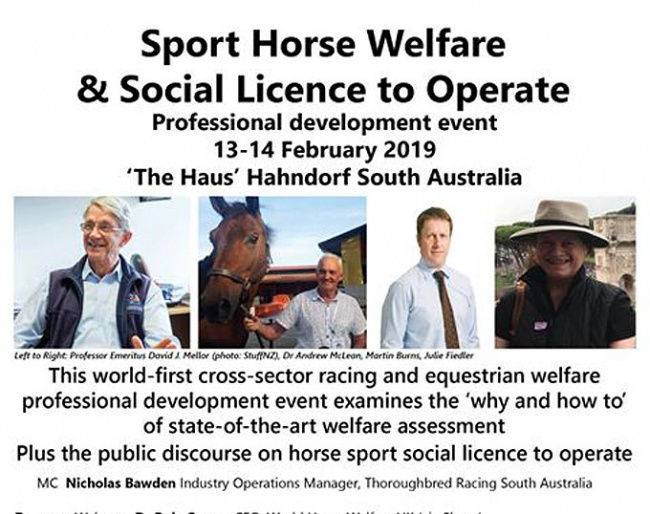
In a ground-breaking, collaborative initiative by Horse SA, equestrian industry, business and social leaders gathered on 13 - 14 February 2019 to discuss "Sport Horse Welfare and Social Licence to Operate."
Taking place in the picturesque South Australian town of Hahndorf, in the Adelaide Hills and hosted by Horse SA, the event provided a platform for leaders from a wide range of racing and equestrian disciplines to learn, network and constructively discuss the incorporation of state-of-the-art animal welfare assessment frameworks in the Horse Sports context.
Participants travelled from all over Australia, New Zealand and Hong Kong, and included sport governing body executives, veterinarians, equine scientists and social leaders representing both racing codes, and a wide range of equestrian and recreational disciplines.
Keynote speakers were Emeritus Prof. David Mellor, Foundation Director of the Animal Welfare Science and Bioethical Centre, Massey University, NZ, Martin Burns, General Manager NZ Thoroughbred Racing, Dr Andrew McLean, Co-Director of Equitation Science International and Julie Fiedler EO Horse SA. The MC was Nicholas Bawden, Industry Operations Manager for Thoroughbred Racing who provided sponsorship of the event and were actively engaged in bringing it to fruition.
A recorded welcome message by Dr Roly Owers, CEO of World Horse Welfare, set the scene for the event, featuring the key message that social licence is about bringing trust and accountability for horse welfare to the public.
The event proposed the Five Domains Model as a structured and constructive approach for continuous monitoring and welfare assessment of horses in sport, a concept that New Zealand Thoroughbred Racing (NZTR) is embedding in their new welfare policy.
Martin Burns gave an overview of NZTRs welfare review process and the reasons for adopting an evidence-based approach: “The Five Domains Model brings credibility and gives us a workable framework” says Burns. “We’ve been lucky to work with Prof. Mellor, a world leader in animal welfare science, who made himself available and engaged with us from the beginning.
“The minimum standards in our upcoming policy are set higher than the minimum standards in legislation because NZTR want to set conditions and provisions for horses that are adequate or very good. After consultation with our industry, we will make it available for everyone else to review, copy or adapt. If other horse pursuits pick it up as a common approach that will be great, because then we will all be speaking the same language. ”
Adopting a structured way for continuous assessment and monitoring of welfare improvements will be crucial to the sustainability of all horse sports and recreational organisations because welfare underpins societal acceptance of how we use horses.
Dr Andrew McLean reflected on the levels of uptake of evidence-based research world-wide over recent years. The first slide of the presentation quoted Schopenhaur (1788-1860) ‘All truth passes through three stages: First it is ridiculed, secondly its violently opposed, third, it is accepted as being self-evident’. Dr McLean went on to stress the need for equitation science to be included within University courses world-wide, for horse trainers to eliminate the use of the term ‘naughty horse’ when conflict behaviours present and, instead, to incorporate how horses learn (learning theory). Finally, horse carers must consider what is positive horse welfare and not just ‘good care or well-being’ of the horse.
Julie Fiedler explained the importance of maintaining social licence to operate through making welfare decisions in the company of the public because such decisions attract a global audience: “Through having a structured approach to address horse welfare it provides organisations with a framework to build capacity amongst all participants when contributing to public conversation on sport horse welfare. Sport participants, after all, are the primary interface with the public”.
Above all, this world-first event provided an excellent opportunity for leaders and influencers from different areas of the horse sector to build strong relationships, bounce ideas and establish partnerships.
SA Racehorse Owners representative Ken Cock said: “Coming to this event has been really useful to me and an enormous learning experience. It’s helped me to understand that we all have a responsibility, everyone within the industry, to actually present the industry in the best light possible with the understanding that not everybody sees things in exactly the same way as we do.”
Catherine Ainsworth, CEO Pony Club Australia: “Pony Club Australia is the foundation of equestrian sport and we recognise the critical role we play in education, and the role of education in promoting horse welfare. The Horse SA Event has provided an excellent framework that will help us complete our new equine welfare policy based on the Five Domains”.
The networks developed over the last days link us together around the common interest of optimum horse welfare throughout the animal’s life - for example the retraining of ex racehorses for a riding career with a Pony Club Member. It is a big step forward to establish a common language on what constitutes good animal welfare for a sport horse.
Presentations and information gathered at the event are being uploaded as available here.
Related Links
Roly Owers: "Do Federations Actively Place Welfare at the Heart of Their Strategy?"
Roly Owers: "Appropriate Education in the Fitting and Use of Tack is Vital"
Global Overview of Ethics and Responsibilities in Horse Sport: From Birth to Death
Wolframm, Clayton, McLean: Where Science Becomes Knowledge
Andrew McLean: "Dressage is a two-way-game"
Dr. Andrew McLean: Training Horses with Knowledge of Equine Psychology